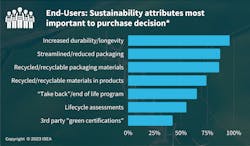Sustainability Concerns Are Impacting PPE Purchasing Decisions
Eighty percent of safety managers believe that sustainability is an important purchase criterion when it comes to choosing PPE, according to a new study conducted by the International Safety Equipment Association (ISEA), the American Society of Safety Professionals (ASSP) and EHS Today. And the PPE suppliers are paying attention to that trend, as almost all (96%) of the safety equipment and PPE suppliers surveyed said they already have several sustainable business practices in place. What’s more, 44% have formal, company-wide sustainability programs.
The study, “Protecting Workers and Planet: Sustainability in the PPE and Safety Equipment Industry,” examines how safety equipment suppliers are increasingly offering products that not only protect workers but also support companies’ corporate sustainability goals. Both EHS professionals and safety product suppliers participated in confidential surveys about current practices and needs, as well as expectations for the future.
“Over the last several years, the growth of sustainable products has skyrocketed, especially in the consumer world,” says Cam Mackey, ISEA’s president and CEO. “And, while most businesses are still developing their own approach towards sustainable purchasing, now is the time for providers of PPE and safety equipment to prepare for a future where a certain degree of sustainability practices will likely be table stakes.”
“[EHS] professionals are well positioned to influence change within their organizations to promote better sustainability practices,” adds Jim Thornton, president of ASSP. “Increased worker expectations in this area are prompting companies to invest in the future and to invest in people as part of the triple bottom line—people, planet and prosperity.”
According to the survey, 70% of safety professionals believe it’s important for PPE suppliers to calculate the sustainability benefits of their products, making it easier to factor sustainability into the purchase decision. That doesn’t necessarily mean users are likely to pay considerably more for sustainable PPE, but the survey indicates they’re twice as likely to pay a “sustainability premium” for suppliers who quantify sustainability benefits.
Safety professionals also emphasized that sustainability, while increasingly important, does not supersede the need to protect workers from harm. As Mackey points out, “Since several end-users voiced concerns about taking focus away from PPE’s core purpose of protection, suppliers should provide proof points that their sustainable products are able to perform and protect equally or more effectively than their traditional ones.”
The sustainability attributes most important to safety professionals are:
- Improved product longevity/durability (important to 96% of respondents)
- Streamlined/reduced packaging (87%)
- Packaging with recycled/recyclable materials (86%) (see chart).
Given that safety professionals are typically among their companies’ most vocal supporters of sustainability initiatives, investing in sustainable practices could prove to be a winning strategy for PPE suppliers going forward.
About the Author

Dave Blanchard
Editor-in-Chief / Senior Director of Content
During his career Dave Blanchard has led the editorial management of many of Endeavor Business Media's best-known brands, including IndustryWeek, EHS Today, Material Handling & Logistics, Logistics Today, Supply Chain Technology News, and Business Finance. In addition, he serves as senior content director of the annual Safety Leadership Conference. With over 30 years of B2B media experience, Dave literally wrote the book on supply chain management, Supply Chain Management Best Practices (John Wiley & Sons, 2021), which has been translated into several languages and is currently in its third edition. Prior to joining Endeavor/Informa/Penton, he spent a decade covering the artificial intelligence industry. He is a frequent speaker and moderator at major trade shows and conferences, and has won numerous awards for writing and editing. He is a voting member of the jury of the Logistics Hall of Fame, and is a graduate of Northern Illinois University.

